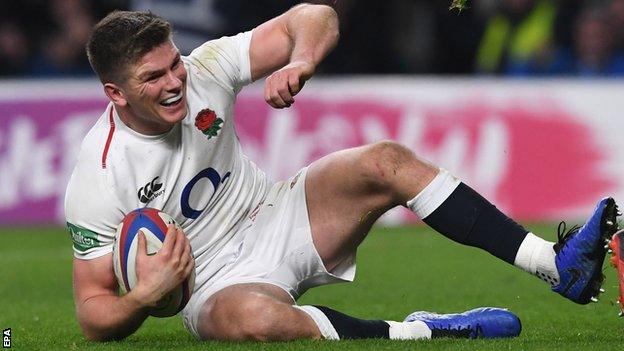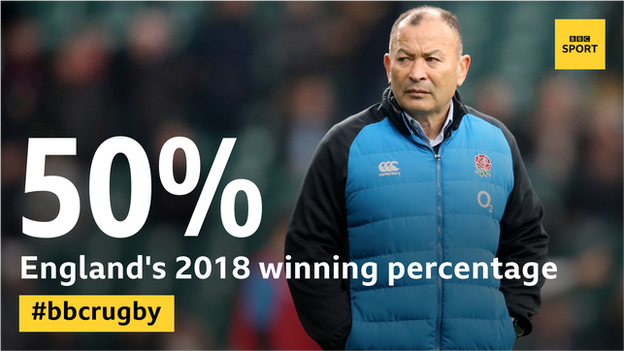England 37-18 Australia: Eddie Jones refuses to criticise controversial Owen Farrell tackle
- Published
England produce second-half masterclass against Australia
England coach Eddie Jones refused to criticise captain Owen Farrell for a controversial tackle in his side's impressive 37-18 win over Australia.
Farrell's hit on Izack Rodda saved an almost certain try that would have put the visitors four points up.
It appeared to be a shoulder charge, reviving memories of Farrell's tackle on South Africa's Andre Esterhuizen.
"We'll leave it up to the TMO, the referee didn't think it was anything wrong," Jones told BBC Sport.
The tackle on second row Rodda happened just before half-time and the sides went into the break level at 13-13 following tries for England wing Jonny May and Australia full-back Israel Folau.
England scored 24 points in the second half to pull clear with Elliot Daly, Joe Cokanasiga and Owen Farrell crossing before Folau went over at the end for his second try.
'Farrell tackle should have been referred'
Referee Jaco Peyper did not ask the television match official to look back at the Farrell-Rodda incident, but did call upon the TMO before ruling out winger Dane Haylett-Petty's first-half try for a forward pass long after the winger had touched the ball down.
"The TMO has been popular hasn't he?" said Jones. "We've had some good results and some not good results."
Wallabies coach Michael Cheika could not hide his disappointment at Peyper's calls.
"Without a doubt that Farrell tackle should have been referred by the referee," he said.
"We had a referees' meeting the other week and I was told that the Farrell tackle against South Africa was a penalty, so if that's a penalty the one today was at least worth three penalties.
"This one was more blatant. No one got hurt, but it doesn't matter if it's reckless or intentional. But to not even refer it - you've got to ask the question."

Owen Farrell crossed in the second half as England beat Australia 37-18
Jones' men end the autumn with three wins from four, although once again they struggled to assert themselves in the first half against a poor Wallabies side.
"We dropped off a bit in our bounce defence, they pulled our defenders out of normal positions by playing wide but we improved on that in the second half," added Jones.
"We struggled in attack in the first half, spilled a few balls we shouldn't have and we just became a bit more direct with our lines and continued to put pressure on Australia.
"If you look at the side, I think we had the most inexperienced side of all the internationals today, 380 caps.
"That's a side in kindergarten, and we're able to play with that poise under pressure. It really pleased me that a young side has been able to develop, cope with the expectation and pressure and perform well.
"When I took over I said we want to be the best in the world and that's not changed but our next focus is Ireland. I can't wait for it, I wish we could play them tomorrow."
Positive end to an erratic year
Wasps' Elliot Daly, who scored England's second try early in the second half, called the performance "the best attacking game" of his 25 caps for the national side.
For England, it was a positive end to an erratic 2018. They finished fifth in the Six Nations, ending the competition with three defeats, while they lost a summer series 2-1 in South Africa.
This November has seen a significant improvement with wins over South Africa, Japan and Australia, and a one-point defeat by the All Blacks.
Daly added to BBC Sport: "We want to start piling on the pressure on teams and sometimes we lose the pressure by forcing it. If we can start pressing on the throats of teams we'll keep winning games.
"We keep telling the young players players like Joe Cokanasiga to keep doing what they do, they've been excellent for their clubs so that's what we want from them and from him; just keep running players over and scoring tries."

England finish 2018 with six wins and six defeats